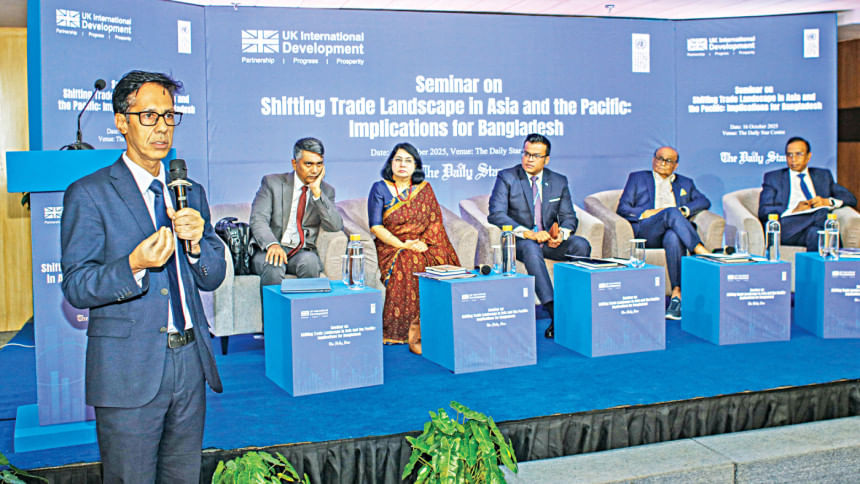Originally posted in The Daily Star on 17 October 2025
Bangladesh should tap Asian markets as protectionism reshapes trade: experts

Owais Parray, senior economic adviser at the UNDP Bangladesh, speaks at a seminar on shifting trade landscape in Asia and the Pacific organised by The Daily Star in collaboration with UNDP Bangladesh at the newspaper’s office in Dhaka yesterday. The event was attended by other economists, analysts, policy experts and UN officials. Photo: Star
As rising protectionism across major economies continues to shape global trade, Bangladesh should pivot towards emerging Asian markets to expand its trade horizons, experts said yesterday.
Currently, the country’s exports remain heavily concentrated in European and American markets — both increasingly affected by tariff-based protectionism and the breakdown of multilateral trading norms, they noted.
The experts, including economists, analysts, and high-ups of the United Nations, were speaking at a seminar on the shifting trade landscape in Asia and the Pacific, organised by The Daily Star in collaboration with UNDP Bangladesh, at The Daily Star office in Dhaka.
They identified the US’s recent move to impose reciprocal tariffs on countries as an example of the most difficult protectionism in global trade and stated that it remains unclear how far such measures will go as negotiations continue.
On the other hand, they pointed out that Asian markets now account for about 40 percent of global GDP, with rapidly expanding consumer bases and strong economic growth, presenting major opportunities for Bangladesh’s export diversification.
Md Hafizur Rahman, administrator of the Federation of Bangladesh Chambers of Commerce and Industry (FBCCI), said Bangladesh should continue to negotiate trade deals under the World Trade Organization’s multilateral framework, even though it is under significant strain from protectionist trends.
He urged policymakers to prioritise Asian markets but noted that major regional and bilateral agreements such as the Regional Comprehensive Economic Partnership and the Comprehensive and Progressive Agreement for Trans-Pacific Partnership have yet to deliver significant results, except for groupings like ASEAN and the EU.
Rahman also called for reducing logistics and unnecessary trade licensing costs, including import and export registration certificates and their renewal, as those things hardly add any value.
Zaidi Sattar, chairman of the Policy Research Institute (PRI) of Bangladesh, recommended rationalising the high trade tariffs, currently averaging around 28 percent, as they discourage other countries from signing trade deals with Bangladesh.
He argued that tariff reduction is not necessarily detrimental to revenue collection. “In the 1990s, when the tariff rate was reduced drastically, revenue generation doubled.”
The unnecessarily higher tariff to protect local production units ultimately created an anti-export bias, and the expected export product diversification did not take place, he added.
Fahmida Khatun, executive director of the Centre for Policy Dialogue (CPD), said Bangladesh should simultaneously continue both export-led economic growth and strengthen the domestic economy to be more competitive.
She pointed out that negotiations among countries within the WTO framework have often stalled, leading nations to shift toward bilateral and regional trade agreements. “Simply put, multilateralism is no longer functioning as effectively as before.”
The CPD executive director, however, noted that Bangladesh, a least developed country, has been among the few that managed to take advantage of a supportive global trade environment.
Also speaking at the event, Owais Parray, senior economic adviser at UNDP Bangladesh, said earlier estimates suggested that about $1 billion worth of exports in Asia were at immediate risk, and around $47 billion potentially at risk from new US tariffs.
For Bangladesh, he noted that recent estimates, including one by Research and Policy Integration for Development (RAPID), indicate a possible 14 percent drop in exports to the US under current conditions.
Citing the RAPID report, Parray said China’s exports to the US have fallen sharply, while its trade with ASEAN and other regional partners has increased slightly, part of a broader shift toward intra-Asian trade.
He went on to explain further shifts in trade relationships with the US.
“In 2000, 54 percent of Cambodia’s exports went to the US; today that share has declined as the EU’s has grown. Similar trends are seen across the region, alongside a steady rise in intra-regional trade within Asia-Pacific,” Parray said.
Indonesia and others began exporting more to non-US destinations, though dependence on US trade remains significant in many cases, he also noted.
“Globally, we are clearly living in a more restrictive trade environment, which has surged from $600 billion last year to around $2 trillion between October 2024 and May 2025. Tariffs and non-tariff barriers are both increasing,” said the senior economic adviser.
Mahfuz Kabir, research director at the Bangladesh Institute of International and Strategic Studies, said during tariff negotiations with the US Trade Representative (USTR), Bangladesh included local importers to demonstrate efforts to reduce its trade gap with the US.
The government also signed an agreement to import 3.5 million tonnes of American wheat as part of its effort to narrow the trade imbalance, he said. “Bangladesh’s primary goal was to reduce tariffs, not to finalise a trade deal with the US,” Kabir noted.
The US wants the materialisation of the commitments that Bangladesh made during the negotiation and possible signing of the trade deal, he added.
The event was moderated by Syed Yusuf Saadat, economist for UNDP Bangladesh.


